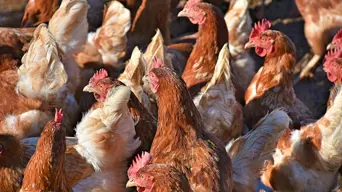Astral Foods, South Africa’s biggest poultry producer reports a 11% jump in profit
Rafiq Wagiet
17 November 2025 | 17:07The company is, however, spending R120 million annually on diesel to run its operations, in addition to covering water costs due to failing municipal infrastructure.

Chicken / Pixabay: RitaE
Stephen Grootes interviews Gary Arnold, CEO of Astral Foods Limited, about the company's year end results for the period ending 30 September 2025.
Listen to the interview in the audio player below.
Astral Foods has reported solid revenue growth for the financial year ending 30 September 2025, with group revenue rising 10.4% to R22.6 billion, up from R20.5 billion the previous year.
The company’s Poultry Division remained its main revenue driver, contributing 82.5% of total external revenue, while the Feed Division accounted for 17.5%.
Astral said the revenue boost was mainly due to higher broiler slaughter volumes and increased sales during the second half of the year, supported by a recovery in selling prices after a period of price deflation in the first half.
The Feed Division also delivered growth, expanding its external customer base and benefiting from higher internal feed demand, which together helped lift revenue in the segment.
The Group says it has strengthened its financial position over the past year, ending its 2025 financial period with more than R1 billion of cash on hand. The improvement comes after the group generated R1.7 billion in cash from its operations, part of a broader strategy to rebuild its balance sheet.
On the back of the stronger cash position and improved earnings, Astral declared a final dividend of 880 cents per share. This brings the total dividend for the year to 1,100 cents per share, a 112% increase compared to the previous year.
Speaking to Stephen Grootes on The Money Show, Gary Arnold, CEO of Astral Foods says they have managed to achieved profit despite difficult conditions.
"We know national load shedding is no longer an issue, but within the municipalities themselves we battle from time to time with electricity supply on infrastructure that we haven't seen upkeep on for many years," says Arnold.
He says they experience regularly water disruptions at their operations, while a massive diesel bill adds to their costs.
"On average, a R10 million a month bill for diesel and to cart water around is certainly not an ideal environment. That's R120 million a year and an unnecessary cost on services that should otherwise be provided by the municipality," adds Arnold.
Scroll to the top of the article to listen to the full interview.
Get the whole picture 💡
Take a look at the topic timeline for all related articles.
Trending News
More in The Money Show

11 February 2026 20:30
Why companies are rethinking bonuses and benefits in 2026 (OM Remchannel)

11 February 2026 19:48
Romance scams hit overdrive this Valentine’s week, warns Fraud Prevention Service

11 February 2026 19:00
Standard Bank optimistic about SA sustaining economic momentum, highlights risk factors













